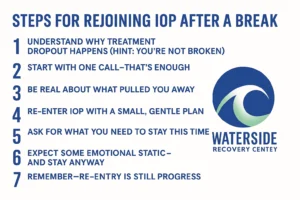There’s a quiet kind of guilt that shows up when you step away from treatment. Maybe you told yourself it would just be a few missed sessions. Maybe you ghosted entirely. Maybe no one knows you stopped showing up—except you.
If that’s where you are right now, this is for you.
Coming back to IOP after a break can feel awkward. But it doesn’t have to be. At Waterside Recovery, our IOP in Plymouth County isn’t just for people who do treatment “right.” It’s built with room for the real, messy, nonlinear process of healing. That includes detours. And restarts. And showing back up when you’re not sure if you’re still allowed.
You are.
1. Understand Why Treatment Dropout Happens (Hint: You’re Not Broken)
You didn’t fail. You didn’t ruin your shot. You’re not the exception.
People leave treatment programs for all kinds of reasons—some internal, some external, most a mix of both. We’ve seen it all:
- A big emotion bubbled up and felt too much to handle.
- A sudden work schedule shift made attending feel impossible.
- You missed a few groups, then felt too ashamed to return.
- You were doing better—and thought maybe you didn’t need the structure anymore.
What matters now isn’t the reason you left. It’s the fact that you’re considering coming back. That takes strength. Let’s build on it.
2. Start With One Call—That’s Enough
The single hardest part of returning to IOP is not the intake. It’s not rejoining the group. It’s making the call.
That first outreach can feel loaded. What will they say? Will they ask why you left? Will they make you start over?
Let’s take the pressure off: No one’s here to shame you. We’ve had clients step away and come back weeks, even months later. Some send an email. Others text first. One client told us:
“I practiced saying, ‘Hey, I think I’m ready to come back’ in the mirror like it was a script. Then I just called and said it exactly like that. And it was enough.”
You don’t need the perfect words. You just need to start the conversation.

3. Be Real About What Pulled You Away
You don’t owe anyone a dramatic story. But it is helpful to name what happened—especially for your care team.
Maybe your anxiety got louder than your motivation. Maybe group didn’t feel like the right fit. Maybe you thought you were okay, and then realized you weren’t.
Whatever it is, naming it gives you a better shot at getting what you need this time around.
At Waterside, we don’t ask, “Why did you leave?” in a judgmental way. We ask, “What felt hard?” and “What do you need more (or less) of now?”
It’s not about digging into guilt. It’s about co-creating safety.
4. Re-Enter IOP With a Small, Gentle Plan
You don’t need to make a big speech about how this time will be different. You don’t need a 6-month recovery plan or a letter of commitment.
Here’s what we often recommend instead:
- Step 1: Pick one day this week to attend a group or individual session.
- Step 2: Identify one support (person, routine, or coping skill) that will help you get there.
- Step 3: Commit to three days, not thirty.
Why three? Because it’s just enough time to re-orient, get past the initial awkwardness, and remember that treatment isn’t about performance—it’s about support.
5. Ask for What You Need to Stay This Time
Coming back doesn’t mean repeating the same plan.
This time, you get to say:
- “I think I need a different group mix.”
- “Evening sessions would work better with my schedule.”
- “I need someone to check in with me midweek, so I don’t drift.”
The truth is, your return gives us better insight into what works for you. You’re not starting from scratch. You’re starting from experience. And that’s valuable.
6. Expect Some Emotional Static—and Stay Anyway
Let’s be real: the first few days back might feel weird.
You might feel out of place. Worried what others will think. Unsure if you still “belong.” You do.
Most people don’t say this out loud, but we hear it all the time privately:
“I was scared I wouldn’t be welcomed back.”
“I felt like I had to earn my place again.”
Here’s what we want you to know: you’re already welcome. You don’t have to explain your way in. You’re allowed to just return.
Group dynamics shift. People come and go. But if you’re showing up with honesty, we’ll make space for you.
7. Remember—Re-Entry Is Still Progress
Progress in recovery doesn’t mean straight lines. It means persistence.
Rejoining IOP is not going backwards. It’s moving forward with more clarity.
You’re learning:
- What throws you off balance.
- What support actually helps.
- How to ask for what you need—even after a pause.
One of our returning clients said it best:
“I used to think leaving was proof I couldn’t do this. Now I see coming back as proof I can.”
You don’t need to be fearless to recommit. You just need to be willing.
FAQ: Rejoining IOP After Dropping Out
Q: Will I be in the same group as before?
Possibly—but not always. If your old group is still running and it feels like a good fit, we’ll invite you back in. If not, we’ll talk through options that match your needs.
Q: Will I have to start the program from the beginning?
Not unless you want to. We usually pick up where you left off or tailor a new plan based on your current situation. Your past work still counts.
Q: Will I get in trouble for ghosting?
No. We don’t shame or punish anyone for stepping away. Life is complex, and sometimes people need space. What matters is your return.
Q: Can I rejoin even if I’ve relapsed?
Yes. We’ll talk about where you are now—not where you were. If a different level of care is needed, we’ll help you explore options. But relapse doesn’t disqualify you.
Q: What if I’m embarrassed to see my old group mates?
That’s normal. But remember—they’re human, too. Most people in IOP have their own stops, starts, and struggles. You’ll likely find more understanding than you expect.
Q: What if I need to go part-time or change my schedule?
We offer flexibility when possible. Whether you’re looking for daytime or afternoon IOP options, we’ll work to meet your needs. Let’s talk about what fits now.
Q: Is it too late to come back?
No. Whether it’s been days, weeks, or months, if you’re ready now, that’s enough.
You’re Not the Only One Who Left—and You’re Not the Only One Coming Back
We see it every week. Someone calls, quietly asking, “Is it okay if I come back?” The answer is always yes.
You’re not late. You’re not behind. You’re here.
And if you’re still unsure? That’s okay. You don’t need total confidence. Just a little courage.
Call (866) 671-8620 or visit https://watersiderecovery.com/program/afternoon-treatment-program/ to learn more about our IOP services in Plymouth County, MA. We’ll help you find your footing—no shame, no pressure, just support.


